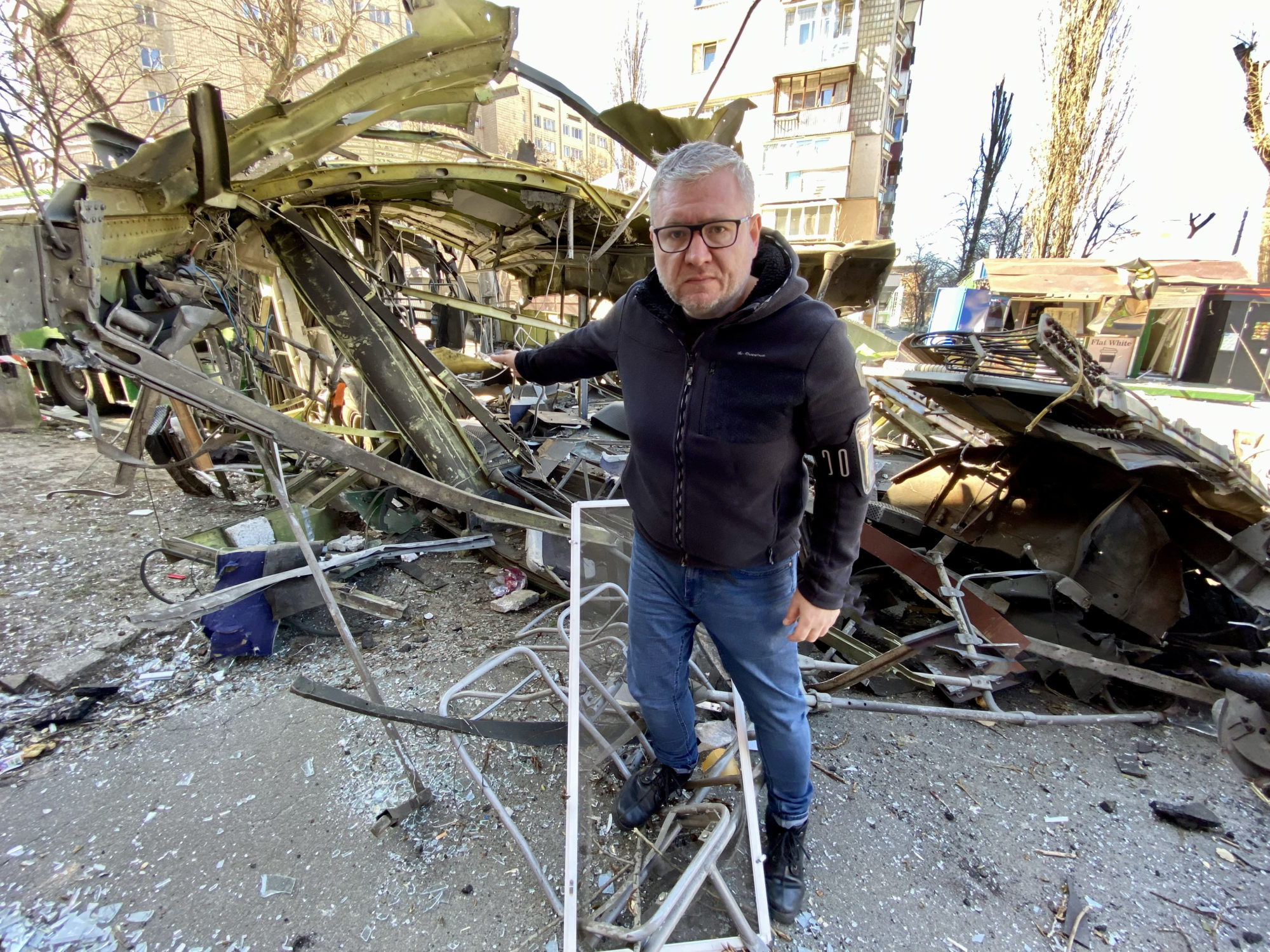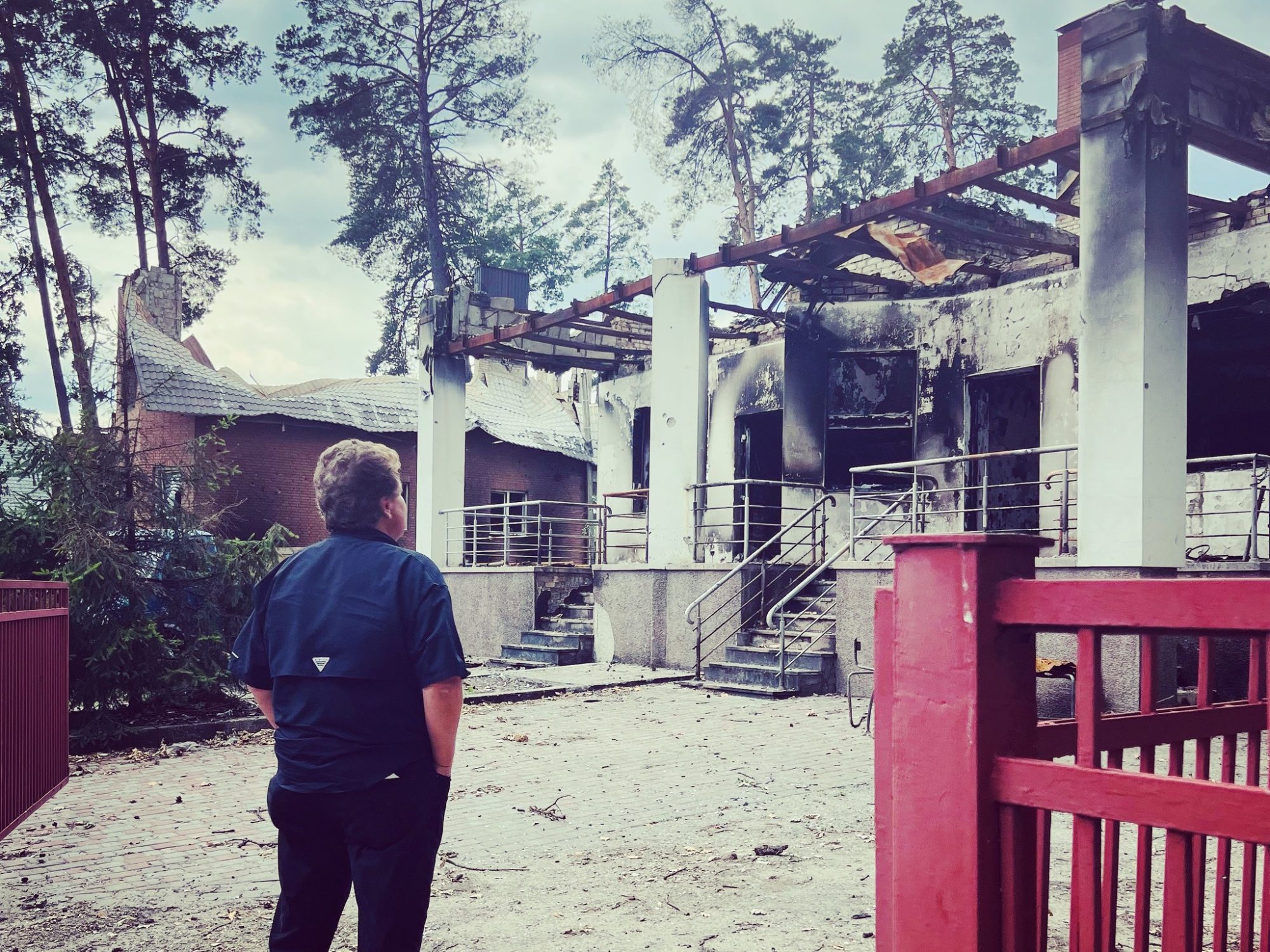The most difficult moment of Sergey Nakul’s life unfolded in a packed Kyiv train station not long after Russia invaded Ukraine. The pastor was sending his wife, his two sons, and a group of members from his local church to safety outside of the nation under attack.
A few weeks earlier, Nakul’s wife insisted on staying with her husband and the church they love, but as Russian assaults grew fiercer and a takeover of Kyiv seemed possible, Nakul gently prevailed: “My beloved, it’s time for you to go.”
He stood on the crowded train platform, holding his wife’s hand and wondering when he would see her, his sons, and his church members again. “It was the most terrible moment for me as the father and pastor responsible for these people,” he says. When news later arrived that the group had reached safety in a bordering country, Nakul felt relief. “Praise the Lord,” he remembers thinking. Now he could serve without fear.
If I am a shepherd in Jesus’s image, how could I leave my people?
Ukrainian regulations required the 45-year-old pastor to stay, along with most men ages 18 to 60. But Nakul felt compelled to remain regardless of the wartime law. Why? “I’m a pastor, that’s the simple answer,” he said in a recent call from his home in Kyiv. He considered how Jesus is a shepherd who would never leave his sheep: “And then if I am a shepherd in Jesus’s image, how could I leave my people?”
Six months later, Nakul is still serving the church in Ukraine and hoping his loved ones can join him soon. Serving without his family is just one of the ways Nakul and others have adjusted to Christian ministry during half a year of unexpected war. The bombings, the displacement of 12 million people, and the uncertainty about the future require ministry leaders to adapt to a changing situation while holding out the hope of the unchanging gospel.
Nakul says the gospel has kept him anchored. “I’ve experienced the amazing faithfulness of the Lord,” he says. “And this very precious.”
Unexpected Messengers
For Nakul, the faithfulness of the Lord began long before he knew about Jesus. As a child living under Soviet control in Ukraine, he had little exposure to the Bible—but he was curious. He spent time in the library reading atheistic books because they contained portions of Scripture the authors tried to refute. It was the only way Nakul could find what he calls “pieces of the gospel.” When he looks back, he sees his inexplicable interest as “just pure grace in [his] life.”
After Ukraine gained its independence in 1991, the Soviet collapse left former Soviet states in an economic spiral. Times were bleak and often desperate, but one afternoon in 1994, Nakul met two young men on the street who asked him a simple question: “Would you like to talk about Jesus?”
The two men, who attended an evangelical church, explained the basics of the Christian faith. They also gave Nakul a copy of the New Testament. “You can’t even imagine what it meant at that time to get a New Testament for free,” Nakul says.
When he read it, the message he found inside “was like fresh air.” “It was like a light,” he recalls. “It was like a door opened to heaven.” A few months later, Nakul embraced saving faith in Christ and dedicated his life to ministry.
Ministry in Wartime
Nakul’s ministry has included nine years as pastor of Grace Reformed Church in Kyiv. When the Russian invasion began on February 24, Nakul turned the church’s basement into a bomb shelter, where they continued to hold worship services, even when the number of attendees briefly dropped to four.

The pastor adjusted to the fluctuating numbers, as some members evacuated the country and others were called to military service in Ukraine. Nakul reported to a military training base himself, but officials sent him home to serve his congregation. A friend who’s the pastor of a nearby Baptist church recently reported to serve as a soldier.
Meanwhile, Nakul documented the war’s destruction in his role as a senior broadcaster for the Far East Broadcasting Company (FEBC), an international Christian radio network. In the early days of the invasion, he recorded videos of destroyed buildings in his neighborhood and reported on the harrowing conditions for Kyiv residents remaining in the city.
Your prayers are helping me to not be so afraid. They are giving my heart peace.
Other broadcasters at FEBC held online prayer meetings and directed listeners to the ministry’s counseling center for spiritual help. During a June prayer meeting, a listener wrote in to say the building next door to her had just been hit by a rocket. “I can hear people screaming,” she wrote. The broadcaster prayed for the frightened listener and heard back a few minutes later: “Your prayers are helping me to not be so afraid. They are giving my heart peace.”
Help for the Wounded
While peace is in especially short supply in some parts of Ukraine, citizens in most places are dealing with the trauma of living in a country torn apart by war. The tensions have created a need for spiritual care that Nakul and other pastors find as urgent as physical needs.
Fedya Minakov says that’s true at seminaries as well.
The professor of Hebrew and Old Testament at the Evangelical Reformed Seminary of Ukraine fled his home in Kyiv when the bombing started in February, and he settled near the country’s western border. (He’s since been reunited with his family, who joined him again after initially evacuating to Holland.)
The seminary has adjusted to wartime conditions by conducting classes online for a student body scattered across Ukraine and Europe, and they’re gearing up for a fall semester that will include a new course already almost full—chaplaincy.
It makes sense in a nation with many men suddenly called to war, but Minakov says the chaplaincy training isn’t just for soldiers. Pastors are asking for more specialized training in how to help congregants and others in the community suffering from problems like PTSD after months of bombings, deaths, destruction, family separations, and displacements. “They need help with being a pastor in a country where everyone is suffering from war,” he says.
They need help with being a pastor in a country where everyone is suffering from war.
Pastors also need training to continue the ordinary work of church planting, even under extraordinary circumstances. Minakov says pastors and students scattered across Ukraine and Europe are seeing the need for more churches with faithful preaching in areas where people are becoming more spiritually responsive. “Their lives are being threatened, and so they ask big questions,” he says of people in local communities. “And we can tell them that the Bible and Christ have the only real answers to these questions.”
Wartime as a Harvest Field
Sergey Rakhuba is encouraged by the responsive ministry of local churches that he’s witnessed as the president of Mission Eurasia, an evangelical ministry that trains and mobilizes church leaders across the region, including in Rakhuba’s native Ukraine.

Though the ministry isn’t a humanitarian organization, it has responded to many needs over the last six months. Working with local churches, the group supports refugee centers and day camps for thousands of displaced children. Within Ukraine, the group has also sent some of the first volunteers to help citizens in areas seized by Russia and liberated again by Ukrainian soldiers.
Rakhuba said a ministry team recently reached a village of about 500 people in a region that had fallen under Russian control for two or three months before Ukrainian forces expelled the Russians. The team reported residents were hungry and desperate, saying Russian soldiers had slaughtered all the cattle in their small town. The team distributed food packages and Scripture to the residents—a ministry still underway in other regions as well.
The churches are rising from the ashes of destruction.
Rakhuba is grateful for the many evangelical churches that have remained flexible and on the forefront of serving their communities. “The churches are rising from the ashes of destruction,” he says.
Hope for the Future
Back in Kyiv, pastor Sergey Nakul continues to adapt, and he continues to see the value of remaining a steady presence with his congregation in Kyiv as well as his work at the FEBC radio network. He hopes his family will be able to rejoin him soon, but says he was boosted by a recent visit from his wife—the first time he had seen her since her evacuation. “It was like we had a honeymoon,” he says. “It was six days that were completely refreshing.”
Until the couple is united again, the pastor says he continues to be refreshed by God’s grace that has followed him since his earliest days. “I tell people I don’t know what will happen next,” he says. “But the only assurance you could have as a child of God is trusting in the precious promises of God embodied in Christ.” Nakul says the message he emphasized at the beginning of the war is the one he still proclaims now: “God is with us.”
Is there enough evidence for us to believe the Gospels?
 In an age of faith deconstruction and skepticism about the Bible’s authority, it’s common to hear claims that the Gospels are unreliable propaganda. And if the Gospels are shown to be historically unreliable, the whole foundation of Christianity begins to crumble.
In an age of faith deconstruction and skepticism about the Bible’s authority, it’s common to hear claims that the Gospels are unreliable propaganda. And if the Gospels are shown to be historically unreliable, the whole foundation of Christianity begins to crumble.




































